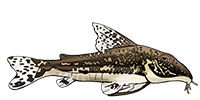Pangasius & ICK
Pangasius & ICK
Do most Pangasius develop a case of ick more frequent than other fishes? I've had more cases of ick with them than any other species.
- sidguppy
- Posts: 3827
- Joined: 18 Jan 2004, 12:26
- My articles: 1
- My images: 28
- My aquaria list: 5 (i:0)
- Spotted: 9
- Location 1: Southern Netherlands near Belgium
- Location 2: Noord Brabant, Netherlands
- Interests: African catfishes and oddballs, Madagascar cichlids; stoner doom and heavy rock; old school choppers and riding them, fantasy novels, travelling and diving in the tropics and all things nature.
- Contact:
-
Osmium
- Posts: 25
- Joined: 21 Jun 2005, 06:50
- Location 1: Scotland
- Interests: Mathematics, fish. chess, and extreme observation .
Pangasius spp.
Hi,
I don't know which species of panagas(s)ius that you are talking about, but I have rarely seen this to be problem.
Ick(whitespot - let's forget about the scientific name... should rarely be a problem, unless you are introducing your waterchanges too cold, + too quickly.
I appreciate your dilemma; normally these fish wish only to survive in groups (but many extraordinary species exist outside the normal description of Fishbase for example) and sucessfully(?) within captivity.
While 'whitespot' remains a relatively easiliy curable disease (within the terms of modern-day proprietary medicines), it is also worthy of note to remember that many 'scaleless' fish (such as loaches, flying foxes and yeah, even freshwater sharks, may react badly to such extreme treatments such as Methylene Blue, Malachite Green or even the much gentler Protozin.
Quarantine.
Having said that, my apparently happy pair are absolutely terrified of being caught and moved, yet love brushing against my hairy hands during gravel changes. Perhaps this is a parasite-removal habit? Don't look at me like that - I have at least one shower a day .
.
Apparently, some species, such as P.sutchi are brought up in rice fields, and harvested as a kind of by-product. The mutual benfit to both plants and fish has been known for centuries.
Do you know which species of shark-cats that you own? I do realise that identification can be very difficult. I have at least one species (a melanistic variety) in my freezer (sadly), right now.
Nick
I don't know which species of panagas(s)ius that you are talking about, but I have rarely seen this to be problem.
Ick(whitespot - let's forget about the scientific name... should rarely be a problem, unless you are introducing your waterchanges too cold, + too quickly.
I appreciate your dilemma; normally these fish wish only to survive in groups (but many extraordinary species exist outside the normal description of Fishbase for example) and sucessfully(?) within captivity.
While 'whitespot' remains a relatively easiliy curable disease (within the terms of modern-day proprietary medicines), it is also worthy of note to remember that many 'scaleless' fish (such as loaches, flying foxes and yeah, even freshwater sharks, may react badly to such extreme treatments such as Methylene Blue, Malachite Green or even the much gentler Protozin.
Quarantine.
Having said that, my apparently happy pair are absolutely terrified of being caught and moved, yet love brushing against my hairy hands during gravel changes. Perhaps this is a parasite-removal habit? Don't look at me like that - I have at least one shower a day
Apparently, some species, such as P.sutchi are brought up in rice fields, and harvested as a kind of by-product. The mutual benfit to both plants and fish has been known for centuries.
Do you know which species of shark-cats that you own? I do realise that identification can be very difficult. I have at least one species (a melanistic variety) in my freezer (sadly), right now.
Nick
Never turn your back on a true friend (fish or otherwise).
-
Osmium
- Posts: 25
- Joined: 21 Jun 2005, 06:50
- Location 1: Scotland
- Interests: Mathematics, fish. chess, and extreme observation .
Pangasious spp.
confused with juvenile Emporer tetras(Nematobrycon palmeri).
The 'delayed' onset of such whitespot may be related to their possible expectations of territory, and also to eventual size-possibilities and resultant stress.
This is not a 'decoy' of thought - some species of catfish look very similar to Pangas(s)ius spp. neither of which should really be kept in captivity, for too long
Let me look into this again: if not just for you; then as much for myself.
See also my p.m.
Nick
Never turn your back on a true friend (fish or otherwise).




